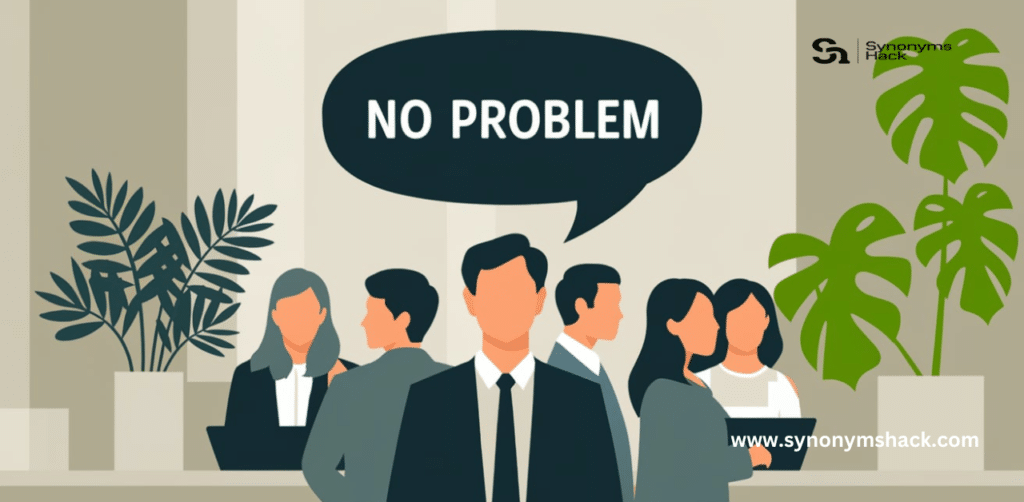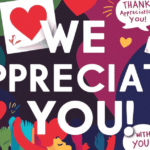Ever found yourself stuck in a conversational rut, repeating “no problem” like a broken record? You’re not alone. This simple phrase has become our go-to response for everything from a quick “thanks” to a heartfelt apology. But let’s face it, language is a playground, and it’s time we swung on some different monkey bars.
In this article, we’ll explore twenty fresh alternatives to “no problem” that’ll spice up your daily chats and elevate your communication game. Whether you’re looking for casual expressions or professional alternatives, we’ve got you covered. So, buckle up and get ready to articulate your way to more engaging conversations!
Read Also: Other ways to say “I agree with You” formally
Is “No Problem” Professionally Acceptable?
Before we dive into alternatives, let’s address the elephant in the room: Is saying “no problem” okay in a professional setting? The short answer? It depends.
While “no problem” is widely used and generally accepted, some argue it’s too casual for formal situations. In a workplace context, it might come across as dismissive or imply that the task at hand could have been problematic..
That said, language evolves, and many professionals use this phrase without issue. The key is to read the room and adjust your language accordingly. When in doubt, opt for more polite responses or professional substitutes that clearly convey your willingness to help.
20 Polite Alternatives to “No Problem”
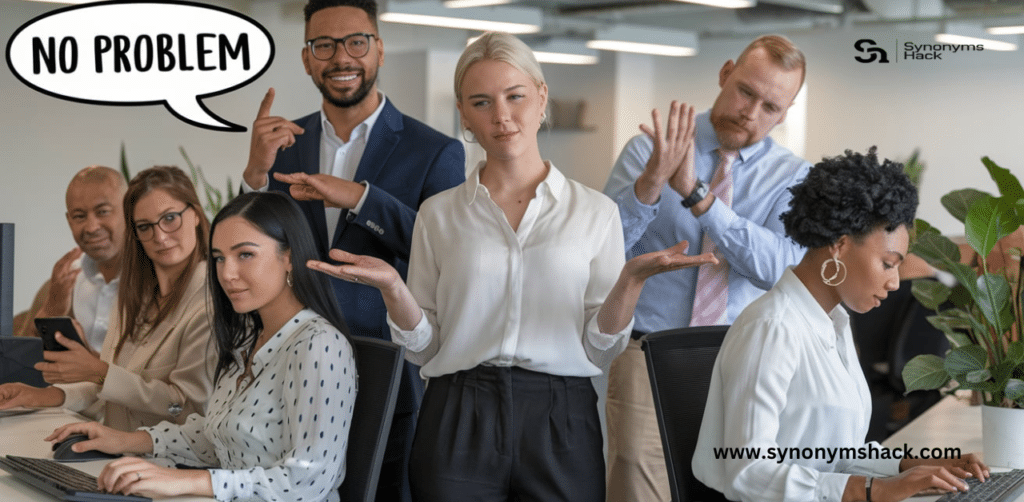
Now let’s learn about 20 polite way to say some one “No Problem”
- It’s my pleasure
- Happy to help
- Glad to be of assistance
- Anytime
- Don’t mention it
- You’re welcome
- Not at all
- I’m happy to help
- No worries
- It was nothing
- I’m glad to be of assistance
- It’s no bother
- I’m here to help
- It’s my job
- No sweat
- The pleasure is mine
- I’m happy to oblige
- It’s no big deal
- I’m glad to contribute
- Think nothing of it
1. “My Pleasure”
This phrase oozes politeness and works wonders in both casual and formal settings. It’s a great way to show that you’re happy to help and that the task or favor wasn’t a burden.
Example in an Email:
Subject: Re: Meeting Rescheduled
Dear Sarah,
Thank you for accommodating the change in our meeting time. I appreciate your flexibility.
My pleasure! I understand how hectic schedules can get. I’m looking forward to our discussion tomorrow at 2 PM.
Best regards, Michael
Example in Customer Service:
Customer: “Thanks for helping me find the right size. You’ve been so patient!”
Representative: “My pleasure! Finding the perfect fit is what we’re here for. Is there anything else I can assist you with today?”
Example in a Workplace Conversation:
Colleague: “Thanks for staying late to help with the project yesterday.”
You: “My pleasure! It was great to see the team pull together and get it done.”
Don’t miss it: Other Ways To Say “Happy Monday”
2. “Happy to Help”
This phrase is a cheerful way to reassure someone that assisting them was no trouble at all. It works well in both professional and casual contexts.
Example in a Team Chat:
TeamMember1: Thanks for explaining the new software to me, Alex!
Alex: Happy to help! If you have any more questions, don’t hesitate to ask.
Example in a Client Email:
Subject: Re: Additional Information Request
Dear Mr. Johnson,
I’ve attached the additional reports you requested for the upcoming presentation.
Happy to help! If you need any clarification on the data, please let me know.
Best regards, Emma
Example in a Friendly Conversation:
Friend: “I can’t thank you enough for watching my dog while I was away.”
You: “Happy to help! Rover’s always a delight to have around. How was your trip?”
3. “Anytime”
This casual expression conveys that you’re always willing to lend a hand. It’s perfect for informal situations and close relationships.
Example in a Text Message:
Friend: Thx for the ride to the airport! You’re a lifesaver.
You: Anytime! Have a safe flight and enjoy your vacation!
Example in a Workplace Scenario:
Colleague: “I really appreciate you covering my shift last minute.”
You: “Anytime! We’re a team, after all. I hope everything’s okay at home.”
Example in a Neighborly Interaction:
Neighbor: “Thanks for helping me move that heavy furniture!”
You: “Anytime! That’s what neighbors are for. Let me know if you need help unpacking too.”
4. “It’s My Pleasure”
A slightly more formal version of “my pleasure,” this phrase works well in professional settings and customer service interactions.
Example in a Business Email:
Subject: Re: Project Completion
Dear Team,
Thank you all for your hard work and dedication in completing the project ahead of schedule.
It’s my pleasure to work with such a talented group. Your efforts have not gone unnoticed, and I look forward to our next challenge together.
Best regards, Jennifer, Project Manager
Example in a Hotel Setting:
Guest: “Thank you for arranging the late check-out. It’s been so helpful.”
Concierge: “It’s my pleasure, Mr. Smith. We always strive to accommodate our guests’ needs. Enjoy the rest of your stay!”
Example in a Professional Network:
LinkedIn Connection: “Thanks for the introduction to your colleague. It led to a great opportunity!”
You: “It’s my pleasure! I’m thrilled it worked out well. Please keep me posted on how things develop.”
You must read: Other Ways To Say “I Hope Everything is Going Well”
5. “Glad I Could Help”

This phrase expresses genuine satisfaction in being able to assist someone. It’s a warm, friendly response that works in various situations.
Example in a Support Ticket:
Customer: The solution you provided fixed my issue. Thank you so much!
Support Agent: Glad I could help! If you encounter any other problems, don’t hesitate to reach out. Have a great day!
Example in a Team Meeting:
Colleague: “Your input on the marketing strategy was invaluable. Thanks!”
You: “Glad I could help! It’s exciting to see our campaign taking shape.”
Example in a Mentorship Scenario:
Mentee: “I really appreciate your guidance on navigating office politics.”
Mentor: “Glad I could help! Remember, every workplace has its quirks. You’re doing great in adapting.”
6. “Not at All”
This brief but effective phrase dismisses any notion that the favor or task was troublesome. It’s versatile and works in both casual and formal contexts.
Example in a Family Setting:
Sibling: “Thanks for picking up the kids from school. I know it was out of your way.”
You: “Not at all! I enjoyed catching up with them on the drive home.”
Example in a Professional Email:
Subject: Re: Document Review
Dear Lisa,
Thank you for taking the time to review the proposal on such short notice.
Not at all! Your draft was well-structured, making the review process smooth. I’ve attached my comments for your consideration.
Best regards, David
Example in a Social Gathering:
Host: “Thanks for bringing that amazing dessert. You didn’t have to go to all that trouble!”
You: “Not at all! Baking is my stress-reliever. I’m just happy everyone enjoyed it.”
7. “It’s No Trouble”
This reassuring phrase clearly communicates that the task or favor wasn’t a burden. It’s perfect for situations where someone might feel they’ve imposed.
Example in a Classroom Setting:
Student: “Professor, thank you for explaining that concept again. I hope I’m not being a bother.”
Professor: “It’s no trouble at all! I’m here to help you understand. Do you have any other questions?”
Example in a Customer Service Call:
Customer: “I appreciate you walking me through all these steps. Sorry for taking up so much of your time.”
Representative: “It’s no trouble! Our goal is to ensure you’re comfortable with the process. Is there anything else I can clarify for you?”
Example in a Friendly Favor:
Friend: “Thanks for helping me move on your day off. I feel terrible for ruining your plans.”
You: “It’s no trouble! What are friends for? Besides, I got a great workout out of it!”
8. “Don’t Mention It”
This casual phrase is a friendly way to dismiss someone’s thanks, implying that no acknowledgment is necessary. It’s best used in informal situations.
Example in a Text Conversation:
Friend: Thx again for the concert tix! You’re the best!
You: Don’t mention it! Just glad you could make it. Wasn’t the show amazing?
Example at a Family Gathering:
Relative: “Thank you for setting up the decorations. The place looks fantastic!”
You: “Don’t mention it! Decorating for family events is always fun for me.”
Example in a Casual Work Environment:
Coworker: “Thanks for grabbing me a coffee. You’re a lifesaver!”
You: “Don’t mention it! I needed the walk anyway. How’s your project coming along?”
Read also: Other Ways To Say “I’m Proud Of You”
9. “I’m Happy to Assist”
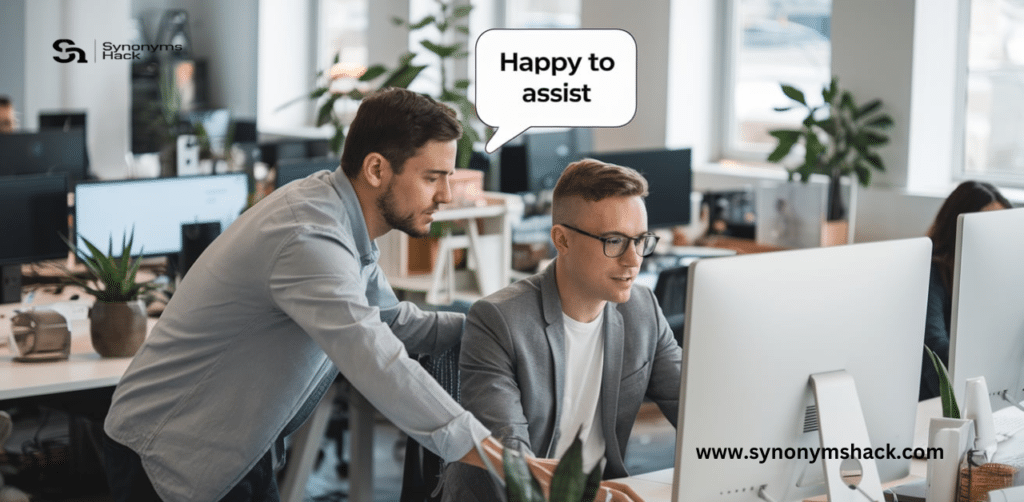
This professional-sounding alternative works well in formal settings and customer service interactions. It conveys both willingness and pleasure in helping.
Example in a Business Email:
Subject: Re: Data Analysis Request
Dear Mr. Chen,
Thank you for providing the additional context for the data analysis.
I’m happy to assist with this project. I’ve already started compiling the necessary information and will have a preliminary report ready by Friday.
Best regards, Sophia
Example in a Retail Setting:
Customer: “Thank you for finding these shoes in my size. You’ve been so helpful!”
Sales Associate: “I’m happy to assist! Finding the perfect fit is crucial. Would you like to try any other styles while you’re here?”
Example in a Professional Conference:
Attendee: “Thanks for clarifying that point during the Q&A. It really helped my understanding.”
Speaker: “I’m happy to assist! Engaging with the audience is one of the best parts of these events. Do you have any other questions?”
10. “It’s All Good”
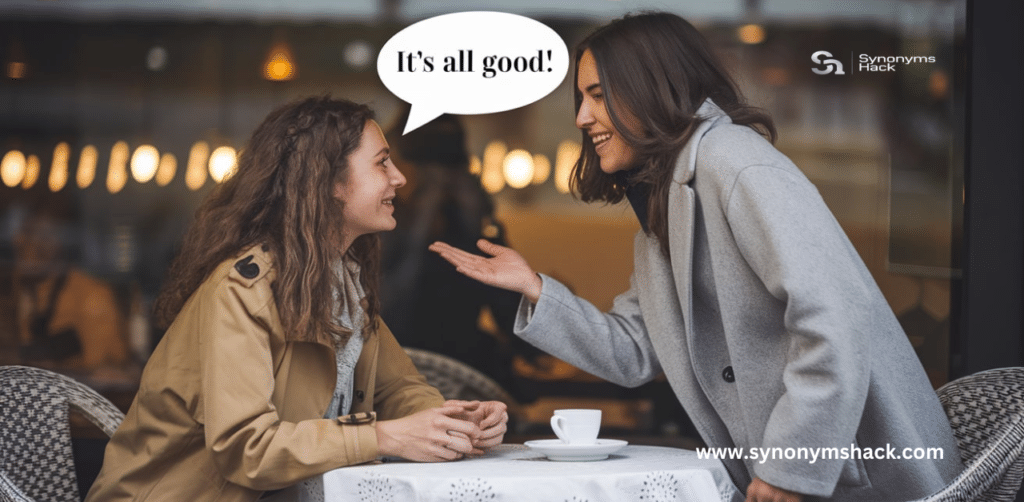
This ultra-casual phrase is best reserved for very informal situations with friends or in relaxed work environments. It’s a laid-back way to say everything’s fine.
Example in a Group Chat:
Friend1: Sorry I’m late to the meetup! Traffic was out of control.
You: It’s all good! We just got here ourselves. Grab a menu and join in!
Example in a Casual Workplace:
Colleague: “Thanks for covering for me during that client call. My internet crashed at the worst moment.”
You: “It’s all good! Tech issues happen to everyone. The client was understanding, and we got it all sorted.”
Example in a Social Media Interaction:
Follower: “Thanks for the shoutout! Didn’t expect that!”
You: “It’s all good! Your content is fire. Keep it up!”
Certainly! I’ll continue with the next 10 ways to say “no problem,” incorporating the keywords and LSI keywords naturally. I’ll also add a relevant external link and bold the anchor text as requested.
11. “I’m Glad to Be of Assistance”
This polite response works well in professional settings, conveying both willingness and satisfaction in helping.
Example in a Client Meeting:
Client: “Thank you for accommodating our last-minute changes to the project scope.”
You: “I’m glad to be of assistance. Our team is committed to ensuring your project’s success.”
Example in an Email:
Subject: Re: Research Support
Dear Dr. Thompson,
Thank you for your guidance on the research methodology.
I’m glad to be of assistance with this study. Your insights have been invaluable in shaping our approach.
Best regards, Rachel
Example in a Mentoring Session:
Mentee: “I really appreciate you taking the time to review my career goals.”
Mentor: “I’m glad to be of assistance. Watching you grow professionally is rewarding for me too.”
12. “It’s No Bother”
This reassuring phrase is perfect for situations where someone might feel they’ve inconvenienced you.
Example in a Workplace Context:
Colleague: “Sorry for dumping all these files on you at the last minute.”
You: “It’s no bother! I’ve got some time this afternoon to sort through them.”
Example in a Family Setting:
Sibling: “Thanks for picking up Mom’s prescription. I hope it wasn’t out of your way.”
You: “It’s no bother! The pharmacy is right by my office. How’s Mom feeling?”
Example in a Neighborly Interaction:
Neighbor: “I appreciate you taking in my packages while I was away.”
You: “It’s no bother! That’s what neighbors are for. I hope you had a great trip!”
You should read: Other Ways To Say “Keep Up The Good Work”
13. “I’m Here to Help”
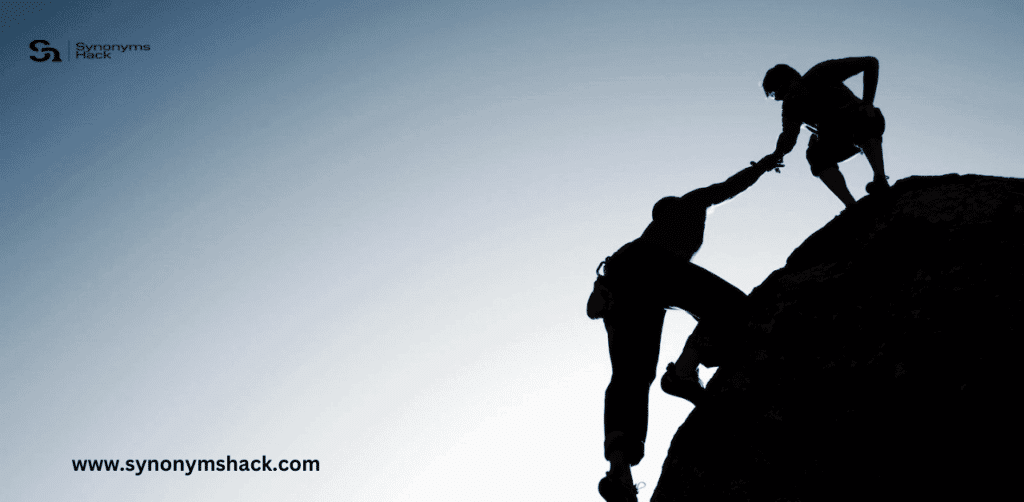
This phrase emphasizes your willingness to assist and works well in customer service or supportive roles.
Example in a Support Ticket:
Customer: Thanks for the quick response to my issue.
Support Agent: I’m here to help! Let me know if you need any further clarification on the solution.
Example in a Team Meeting:
Team Member: “I’m stuck on this part of the project. Any advice?”
You: “I’m here to help! Let’s schedule a brainstorming session and tackle it together.”
Example in a Teaching Scenario:
Student: “Thank you for offering extra office hours before the exam.”
Professor: “I’m here to help! Your success is important to me. Don’t hesitate to bring any questions you have.”
14. “It’s My Job”
While this phrase might seem dismissive, it can actually be a humble way to acknowledge that helping is part of your role or responsibility.
Example in a Customer Service Call:
Customer: “You’ve been so patient explaining all these options to me.”
Representative: “It’s my job to ensure you find the best solution for your needs. I’m happy we could find a good fit!”
Example in a Workplace Email:
Subject: Re: Project Assistance
Dear Tim,
Thank you for your kind words about my contribution to the project.
It’s my job to support our team’s success. I’m glad my input was helpful in moving us forward.
Best regards, Sarah
Example in a Healthcare Setting:
Patient: “Thank you for taking the time to explain my treatment options so thoroughly.”
Doctor: “It’s my job to ensure you’re fully informed about your health. Do you have any other questions I can address?”
15. “No Sweat”
This very casual expression is best used in informal situations with friends or in relaxed work environments.
Example in a Text Conversation:
Friend: Thx for helping me move those boxes! You’re a lifesaver.
You: No sweat! That’s what friends are for. How’s the unpacking going?
Example in a Casual Workplace:
Colleague: “Thanks for covering my shift last minute. I owe you one!”
You: “No sweat! We’ve all been there. Just grab me a coffee next time you’re out!”
Example in a Social Media Interaction:
Follower: “Thanks for the awesome tutorial! It really helped me level up my skills.”
You: “No sweat! Glad it was useful. What project are you working on next?”
16. “The Pleasure Is Mine”
This formal expression is perfect for professional or high-etiquette situations, conveying both politeness and sincerity.
Example in a Business Networking Event:
Contact: “Thank you for introducing me to your colleagues. It’s been invaluable for my business.”
You: “The pleasure is mine. I’m always happy to connect professionals in our industry.”
Example in a Thank You Email:
Subject: Re: Guest Speaker Appreciation
Dear Professor Martinez,
Thank you for the opportunity to speak to your class about real-world applications of data science.
The pleasure is mine. Engaging with curious students always reinvigorates my passion for the field. Please let me know if you’d like me to return for future sessions.
Best regards, Dr. Emily Chen
Example in a Formal Dinner:
Host: “Thank you for bringing that exquisite wine. It paired perfectly with the meal.”
You: “The pleasure is mine. I’m delighted it complemented the dinner so well.”
17. “I’m Happy to Oblige”

This phrase conveys a willingness to help while maintaining a slightly formal tone, making it suitable for professional settings.
Example in a Client Meeting:
Client: “We appreciate your team’s flexibility in adjusting the project timeline.”
You: “I’m happy to oblige. We understand the importance of adaptability in achieving project success.”
Example in an Email to a Superior:
Subject: Re: Additional Task Request
Dear Mr. Johnson,
Thank you for entrusting me with this additional responsibility.
I’m happy to oblige and take on the extra workload. I’ve already begun outlining a plan to integrate these tasks efficiently.
Best regards, Alexandra
Example in a Volunteer Setting:
Event Organizer: “Thanks for stepping in to help with registration. We were short-staffed today.”
You: “I’m happy to oblige! Volunteering is all about pitching in where needed. How else can I help?”
Don’t miss it: Other Ways To Say “I’m Happy For You”
18. “It’s No Big Deal”
This casual phrase downplays the effort involved in helping, making the other person feel at ease about accepting assistance.
Example in a Friendly Conversation:
Friend: “Thanks for listening to me vent about work for an hour!”
You: “It’s no big deal! That’s what friends are for. Feel any better after talking it out?”
Example in a Team Project:
Colleague: “I appreciate you staying late to help me finish the presentation.”
You: “It’s no big deal! The project’s success is a win for all of us. Want to grab a quick dinner before heading out?”
Example in a Family Setting:
Sibling: “Thanks for watching the kids on such short notice. You’re a lifesaver!”
You: “It’s no big deal! I love spending time with my nieces and nephews. We had a blast at the park!”
19. “I’m Glad to Contribute”
This phrase expresses satisfaction in being able to help or add value, making it great for workplace or volunteer situations.
Example in a Committee Meeting:
Committee Member: “Your input on the new policy was invaluable. Thank you.”
You: “I’m glad to contribute. It’s important that we consider all perspectives when making decisions that affect our community.”
Example in a Collaborative Project Email:
Subject: Re: Project Feedback
Dear Team,
Thank you for your positive response to my suggestions for improving our workflow.
I’m glad to contribute to our team’s efficiency. Let’s schedule a meeting to discuss implementation steps.
Best regards, Marcus
Example in a Nonprofit Organization:
Organizer: “Thanks for donating your photography skills for our fundraiser.”
You: “I’m glad to contribute! Using my skills to support such a worthy cause is truly rewarding.”
20. “Think Nothing of It”
This modest response dismisses the need for thanks, implying that the favor or assistance was natural and required no special effort.
Example in a Social Gathering:
Guest: “Thank you for going out of your way to make a vegetarian option for me.”
Host: “Think nothing of it! I want all my guests to enjoy the meal. How do you like the quinoa salad?”
Example in a Workplace:
Colleague: “I appreciate you showing me how to use the new software. It saved me hours of frustration.”
You: “Think nothing of it! We’re all learning together. Feel free to ask if you have any more questions.”
Related Video: This English speaking practice video might be helpful for you.
Example in a Neighborhood Community:
Neighbor: “Thanks for shoveling my driveway while I was sick. You’re too kind!”
You: “Think nothing of it! That’s what neighbors are for. How are you feeling now?”
By expanding your vocabulary with these alternatives to “no problem,” you’ll be able to articulate your responses more eloquently in various situations. Remember, the key to effective communication is choosing the right phrase for the context, whether you’re in a casual conversation or a formal setting.
For more insights on improving your communication skills, check out this article on 10 effective communication techniques from Very well Mind. It offers valuable tips on enhancing your verbal and non-verbal communication, which can complement your expanded repertoire of polite responses.
Final Words: Mastering the Art of Polite Responses
Expanding your repertoire of responses beyond “no problem” can significantly enhance your communication skills. Whether you’re in a professional setting or a casual conversation, having a variety of phrases at your disposal allows you to articulate your thoughts more precisely and maintain a polite, engaging dialogue.
Remember, the key to effective communication lies in adapting your language to the situation. What works in a text to a friend might not be appropriate in an email to your boss. By mastering these alternatives, you’ll be well-equipped to navigate various social and professional scenarios with ease and grace.
So, the next time someone thanks you, why not surprise them with a fresh response? After all, language is a living thing, and keeping it vibrant is no problem at all – or should I say, it’s my pleasure!

Brad Hook is the insightful admin and writer who brings depth and clarity to the world of synonyms. With a talent for making words accessible and engaging, he inspires readers to expand their vocabulary and explore language’s nuances. Brad’s writing helps others communicate more effectively and creatively every day.

